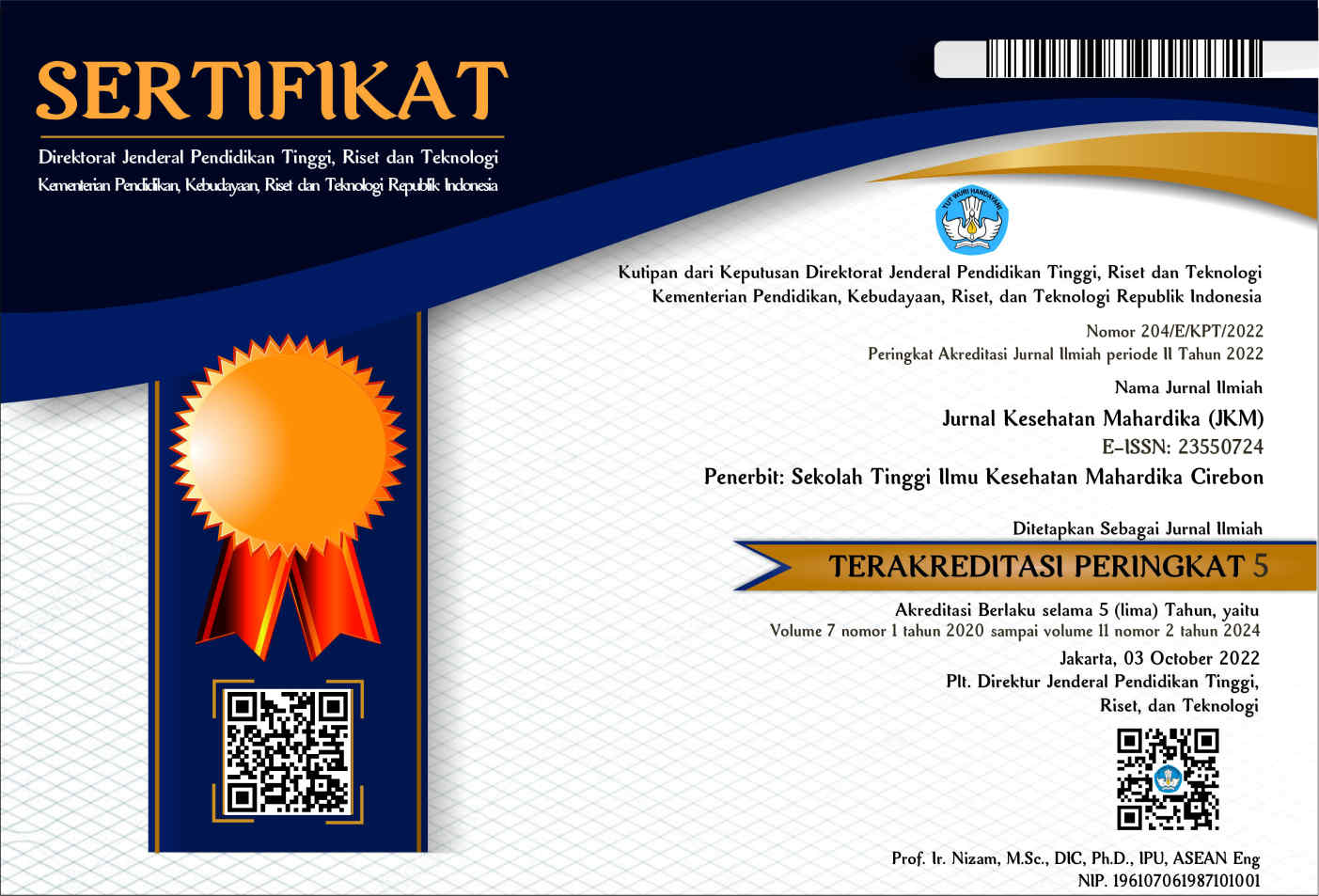Literature Review: Opportunities and Challenges of Using Artificial Intelligence in Enhancing Clinical Pharmacy Services
Keywords:
Artificial Intelligence, Challenges, Opportunities, Clinical PharmacyAbstract
Artificial Intelligence offers opportunities has to optimize clinical pharmacy services in hospitals or other pharmaceutical services. AI can assist clinical pharmacists in the field of clinical pharmacy such as prescription review, therapeutic drug monitoring, monitoring of drug adverse effects, and providing drug information services. The aim of this literature review is to analyze and summarize the opportunities and challenges of AI in supporting clinical pharmacy services. This study uses a literature review method with a qualitative research approach. The selected journal criteria are journals published between 2015 and 2025 and are fully accessible. From the review, eight journals were found that met the criteria for analysis. The result of this literature review indicate that AI can enhance the quality and effectiveness of clinical pharmacy services. The development of AI in clinical pharmacy has just begun, and there are several challenges that need to be addressed, such as data bias, data security, the lack of regulations and ethics, and resistance to AI usage. Evaluation and collaboration with other healthcare professionals and technology experts are needed to improve AI-based clinical pharmacy services.
References
Aung, Y. Y. M., Wong, D. C. S., & Ting, D. S. W. (2021). The promise of artificial intelligence: A review of the opportunities and challenges of artificial intelligence in healthcare. In British Medical Bulletin (Vol. 139, Issue 1, pp. 4–15). Oxford University Press. https://doi.org/10.1093/bmb/ldab016
Babel A, Taneja R, Mondello Malvestiti F, Monaco A, Donde S. Artificial intelligence solutions to increase medication adherence in patients with non-communicable diseases. Front Digit Health. 2021;3:669869. doi:10.3389/fdgth.2021.669869
Bhattamisra, S. K., Banerjee, P., Gupta, P., Mayuren, J., Patra, S., & Candasamy, M. (2023). Artificial Intelligence in Pharmaceutical and Healthcare Research. In Big Data and Cognitive Computing (Vol. 7, Issue 1). MDPI. https://doi.org/10.3390/bdcc7010010
Davahli, M. R., Karwowski, W., Fiok, K., Wan, T., & Parsaei, H. R. (2021). Controlling safety of artificial intelligence‐based systems in healthcare. Symmetry, 13(1), 1–25. https://doi.org/10.3390/sym13010102
Fahim, M. I. A., Tonny, T. S., & al Noman, A. (2024). Realizing the potential of AI in pharmacy practice: Barriers and pathways to adoption. Intelligent Pharmacy, 2(3), 308–311. https://doi.org/10.1016/j.ipha.2024.02.003
Fui-Hoon Nah, F., Zheng, R., Cai, J., Siau, K., & Chen, L. (2023). Generative AI and ChatGPT: Applications, challenges, and AI-human collaboration. In Journal of Information Technology Case and Application Research (Vol. 25, Issue 3, pp. 277–304). Routledge. https://doi.org/10.1080/15228053.2023.2233814
Gawade VR, Apar KS, Mapari RD, Lahane HS, Pawar DVR. From data to drugs a review: harnessing AI for accelerated pharmaceutical development. Int Adv Res Sci Commun Technol. 2023;3:346-350. doi: 10.48175/IJARSCT-12456
Henry Basil, J., Lim, W. H., Syed Ahmad, S. M., Menon Premakumar, C., Mohd Tahir, N. A., Mhd Ali, A., Seman, Z., Ishak, S., & Mohamed Shah, N. (2024). Machine learning-based risk prediction model for medication administration errors in neonatal intensive care units: A prospective direct observational study. Digital Health, 10. https://doi.org/10.1177/20552076241286434
Huang, X., Estau, D., Liu, X., Yu, Y., Qin, J., & Li, Z. (2024). Evaluating the performance of ChatGPT in clinical pharmacy: A comparative study of ChatGPT and clinical pharmacists. British Journal of Clinical Pharmacology, 90(1), 232–238. https://doi.org/10.1111/bcp.15896
Johnson, M., Patel, M., Phipps, A., van der Schaar, M., Boulton, D., & Gibbs, M. (2023). The potential and pitfalls of artificial intelligence in clinical pharmacology. CPT: Pharmacometrics and Systems Pharmacology, 12(3), 279–284. https://doi.org/10.1002/psp4.12902
Kemenkes RI. (2016). Peraturan Menteri Kesehatan Republik Indonesia Nomor 72 Tahun 2016. Kementerian Kesehatan Republik Indonesia.
Khan O, Parvez M, Kumari P, Parvez S, Ahmad S. The future of pharmacy: how AI is revolutionizing the industry. Intelligent Pharmacy.2023;1(1):32-40. doi:10.1016/j.ipha.2023.04.008
Mohanty, S., Harun AI Rashid, M., Mridul, M., Mohanty, C., & Swayamsiddha, S. (2020). Application of Artificial Intelligence in COVID-19 drug repurposing. In Diabetes and Metabolic Syndrome: Clinical Research and Reviews (Vol. 14, Issue 5, pp. 1027–1031). Elsevier Ltd. https://doi.org/10.1016/j.dsx.2020.06.068
Moher, D., Liberati, A., Tetzlaff, J., & Altman, D. G. (2009). Preferred reporting items for systematic reviews and meta-analyses: The PRISMA statement. In BMJ (Online) (Vol. 339, Issue 7716, pp. 332–336). https://doi.org/10.1136/bmj.b2535
O'Reilly D, McGrath J, Martin-Loeches I. Optimizing artificial intelligence in sepsis management: opportunities in the present and lookingclosely to the future. Journal of Intensive Medicine. 2024;4(1):34 doi:10.1016/j.jointm.2023.10.001
Parsaei, H. R. (2021). Controlling safety of artificial intelligence‐based systems in healthcare. Symmetry, 13(1), 1–25. https://doi.org/10.3390/sym13010102
Petkovic, K., Strika, Z., Likic, R., & Lucijanic, M. (2024). Spotlight commentary: Integrating artificial intelligence in clinical pharmacology: Opportunities, challenges and ethical imperatives. In British Journal of Clinical Pharmacology. John Wiley and Sons Inc. https://doi.org/10.1111/bcp.16241
Ranchon, F., Chanoine, S., Lambert-Lacroit, A., Bossan, J., Gaudry, AM., Bedouch. P., (2023). Development of artificial intelligence powered apps and tools for clinical pharmacy services: A systematic review. International Journal of Medical Informatics, 172.
Roosan, D., Law, A. v., Roosan, M. R., & Li, Y. (2022). Artificial Intelligent Context-Aware Machine-Learning Tool to Detect Adverse Drug Events from Social Media Platforms. Journal of Medical Toxicology, 18(4), 311–320. https://doi.org/10.1007/s13181-022-00906-2
Roosan, D., Padua, P., Khan, R., Khan, H., Verzosa, C., & Wu, Y. (2024). Effectiveness of ChatGPT in clinical pharmacy and the role of artificial intelligence in medication therapy management. Journal of the American Pharmacists Association, 64(2), 422-428.e8. https://doi.org/10.1016/j.japh.2023.11.023
Schiff, G. D., Klinger, E., Salazar, A., Medoff, J., Amato, M. G., John Orav, E., Shaykevich, S., Seoane, E. v., Walsh, L., Fuller, T. E., Dykes, P. C., Bates, D. W., & Haas, J. S. (2019). Screening for Adverse Drug Events: a Randomized Trial of Automated Calls Coupled with Phone-Based Pharmacist Counseling. Journal of General Internal Medicine, 34(2), 285–292. https://doi.org/10.1007/s11606-018-4672-7
Schmidt, L., Weeds, J., & Higgins, J. P. T. (2020). Data Mining in Clinical Trial Text: Transformers for Classification and Question Answering Tasks. http://arxiv.org/abs/2001.11268
Tsigelny, I. F. (2018). Artificial intelligence in drug combination therapy. Briefings in Bioinformatics, 20(4), 1434–1448. https://doi.org/10.1093/bib/bby004
Zhavoronkov, A., Vanhaelen, Q., & Oprea, T. I. (2020). Will Artificial Intelligence for Drug Discovery Impact Clinical Pharmacology? In Clinical Pharmacology and Therapeutics (Vol. 107, Issue 4, pp. 780–785). Nature Publishing Group. https://doi.org/10.1002/cpt.1795
Published
How to Cite
Issue
Section
Copyright (c) 2025 Jurnal Kesehatan Mahardika

This work is licensed under a Creative Commons Attribution-NoDerivatives 4.0 International License.













